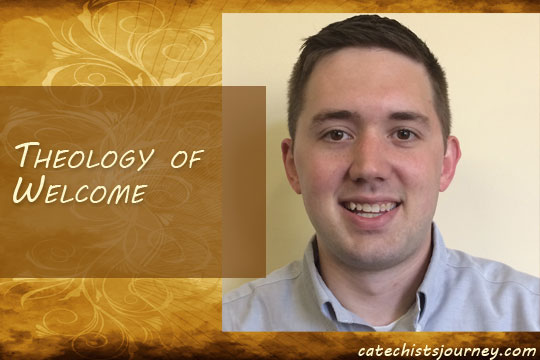
Just over a year ago, Steven Serafin and his pastor were the new people at St. Mary’s Parish in Dover, NJ. This gave them the opportunity to approach faith formation with fresh eyes. As Pastoral Associate and Director of Faith Formation, Steven shared about a parish initiative called the “theology of welcome” in an interview with Loyola Press. Following the message put forth by Pope Emeritus Benedict XVI with the New Evangelization, St. Mary’s is focusing on the meaning of personal invitation.
Loyola Press: What is the “theology of welcome” that St. Mary’s adopted?
Steven Serafin: After my past experiences in ministry as a catechist and pastoral associate, it was clear to me that all people, whether they’ve been a part of the community for years or are new arrivals, are eager for a personal invitation. They crave a space where they feel like they belong and are welcomed. My pastor and I have read resources like Rebuilt and A Pastor’s Toolbox that highlight the need to reevaluate how we’re inviting people into the community. The “theology of welcome” is an ethos, a way of making hospitality and reaching out a more natural part of Church culture.
The theology of welcome focuses on two types of people we see:
- Parishioners who have been a part of the community for years, who attend Mass regularly on Sundays but have not personally been asked to participate in any other part of parish life.
- New people who show up to Mass for one weekend, are newly registered, or those who participate in the sacraments periodically. They are not involved beyond these initial touch points with the community.
The call to make a shift like this in parish culture is an important part of the Church’s ongoing evangelization efforts. Inviting people to come to events or be a part of a parish activity can be easily forgotten during the busyness of the year. Invitations make all the difference for personal conversion and more active involvement.
Loyola Press: Can you explain more about personal invitation?
Steven: The personal invitation focuses on two questions given to us by Christ in the beginning of John’s Gospel (1:38–39). Right after Jesus is baptized the disciples ask, “What are you looking for?” and “Where are you staying?,” to which Jesus responds, “Come and you will see.” Before Christ begins anything, any teaching or instruction, he recognizes that people are looking for purpose and belonging. He invites them to walk with him first.
I’ve met parishioners that are nervous about talking about their faith, or think that they don’t know enough about God to share with someone else. These two questions put their mind at ease. They’re a good place to direct our focus. We all need someone to listen to how we’re doing and provide a place to come and be heard.
This personal invitation can be a kind gesture, a simple conversation, someone to sit with at Mass or a gathering at the parish. Every time we say “come and see” we provide a safe and comfortable starting point for a person or family.
Loyola Press: How have you implemented the theology of welcome and personal invitation in the parish community?
Steven: The theology of welcome and personal invitation had to begin with our staff. Once they felt heard and welcomed into the conversation about the direction of the parish, staff members were empowered to lead by example.
- Our efforts started with first impressions. From the moment someone entered the parish office to when they concluded preparation for one of the sacraments, for instance, a staff member actively listened. Based on what was shared, we considered how the parish could serve the person or family. In many ways the staff became the bridge for new arrivals and established parishioners.
- We greet people before and after Mass so that we can get to know them better. They also feel more comfortable seeing a familiar face!
- After Masses we have “Conversations with Your Pastor” that give us the opportunity to listen to the parishioners’ questions or concerns. It helps us better support them as a community while sharing parish goals.
Following our efforts with the staff, we created a network of leaders and initiatives through ministries in the parish.
- Ministry fairs after Masses on two weekends during the fall season gave ministry leaders a chance to listen to those attending and extend invitations. Many new volunteers and participants joined—a lot of them did not know that these ministries existed at the parish!
- We held a monthly speaker series on the theme of invitation that generated interest on the role that each person plays in the community.
Loyola Press: Where do you see this leading the parish in the future?
Steven: We’ve learned that a single initiative cannot accomplish the goals set out by Pope Emeritus Benedict XVI for the New Evangelization, but instilling a sort of “evangelizer mentality” within a community makes a difference. It’s a simple idea, welcoming someone in a personal way, but it takes practice and strategy as a community. St. Mary’s still has a long way to go, but the small changes we’ve made have led to fruitful results. I see it leading to what Pope Paul VI outlined in Evangelii Nuntiandi about evangelization. He called evangelization a vocation and a part of our deepest identity (EN 14–15). I think we’ll discover who we are as a community and as a part of the Church.
About Steven Serafin
Steven Serafin is the Pastoral Associate and Director of Faith Formation at St. Mary’s in Dover, NJ. He has held a variety of positions in parish and high-school faith formation over the past five years and is passionate about parish development and collaboration. Steven holds a BA in Theology from the Catholic University of America in Washington D.C., and an MA in Theology from the University of Notre Dame, through the Echo Program. He and his wife were married this past May.





Steven, thank you for sharing your thoughts and experiences with the “welcoming” culture and initiatives at your Parish. I was touched by the simplicity and yet powerful focus of the “Come and you will see” approach in extending personal invitations to walk with Jesus.
Can you share any examples of how your Parish’s Catechetical team have implemented “personal invitations” to youth and their families? This past year, I have made more of an effort to be out in the hallway by my CCD classroom to say hello and greet students and their parents as they come in, or get dropped off. It’s a challenge though, because so many parents don’t accompany their son/daughter to the classroom, or just meet them out in the parking lot at the end of class; the parents are often multi-tasking on their smartphones as well! Our Parish Catechetical Director has suggested we invite parents into the classroom on occasion to be a “guest reader”, or help with an activity. We certainly look for touch-points where we might initiate a “come and you will see” invitation.
God Bless you in your ministry!
Hello Mary, thank you for the kind response to to my post. Being able to interact with the parents is crucial to the formation of their children. Hearing about the faith for an hour a week really doesn’t allow the kids to retain the information, let alone begin to live it out. This year we have dedicated a lot of our focus on this Parent Invitation. I encourage all of my catechists to be in constant communication with the parents, explaining what is happening in class, providing them with discussion points to review with their children, and to invite them to come as a class to mass.
For our K -4 grades we ask all parents to walk their children to the classroom, which helps initiate that invitation. We also offer them a monthly speaker series that covers different topics of how to live the faith at home.
For the parents of 5th to 10th graders we will be offering an adult formation session during the same time their kids will be in class. I am not sure how many will take up the offer, but I believe having the option could draw some additional parents. Many of the parents that I have talk to feel in adequate to talk to their child about the faith They bring them to Religious Education, because thats what they did, or their parents are forcing them. I think knowing that they have this mentality we can invite accordingly. Knowing this we can create opportunities were they can feel comfortable to attend and then gradually lead them to a deeper understanding. Some examples, Parents socials, Grade level Meetings, personal phone calls or meetings.
God Bless,
Steven
Enjoyed reading your article. I remember you when you were at St. John Neumann. We have since moved to Ohio. It was just this evening that we hosted a Newcomers Welcome Potluck at our home. It never fails that we will have new parishioners tell us how much they appreciate the invitation. This small gesture has made new parishioners feel welcome in our large parish.
Blessing to you!!
Lynn
Hey Lynn,
So great to hear from you. A Newcomers Welcome Potluck is such a great idea!
Steven